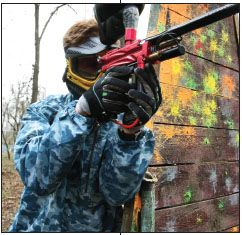- Clinical Technology
- Adult Immunization
- Hepatology
- Pediatric Immunization
- Screening
- Psychiatry
- Allergy
- Women's Health
- Cardiology
- Pediatrics
- Dermatology
- Endocrinology
- Pain Management
- Gastroenterology
- Infectious Disease
- Obesity Medicine
- Rheumatology
- Nephrology
- Neurology
- Pulmonology
Ultra Sports, Weekend Warriors, and the Implications for Primary Care
Contemporary “weekend warriors” are not impressed by the sporting and recreational pursuits of their parents. As a result, they have invented novel games and intensified other activities already considered rigorous a generation ago.
Contemporary “weekend warriors” are not impressed by the sporting and recreational pursuits of their parents. As a result, they have invented novel games and intensified other activities already considered rigorous a generation ago.
The new categories of sport include paintball and skimboarding; the expanded group-wherein competitors carry the label of “extreme” athletes- has added miles to marathons, thereby transforming them into ultra marathons.
For primary care practitioners, these activities present new challenges in preventive and follow-up care. For example, athletes who endure ultra marathons are at risk for severe hyponatremia with resultant brain injury.1 When these athletes compete in exotic locales, they can acquire a host of infectious diseases ranging from malaria to leptospirosis.2

RISKS TO WEEKEND WARRIORS
Even less committed, weekend athletes are at risk. Recreational in-line skating can result in serious head injuries at a rate only slightly less than that of skateboarding. Mountain biking also poses the risk of falls and subsequent trauma, especially if riders do not wear helmets.3
Paintball, which is popular among multiple agegroups, is another weekend recreational activity that can result in serious injuries. Alliman and coworkers4 retrospectively analyzed 36 instances of ocular trauma caused by paintball projectiles; 33 of these injuries were multiple, including 1 orbital fracture. In half of those patients who sustained ocular injury, final visual acuity was less than 20/200. Eighty-one percent of the injuries required surgical intervention, including 7 enucleations. The serious injuries tended to occur outside of organized settings, which is why only 2 of the 36 injured players were wearing safety glasses.
Other reported injuries from this sport include penile-scrotal swelling from a paintball projectile that eventuated in circumcision and wide excision of edematous scrotal skin, followed 6 months later by further excision and a cosmetic procedure.5
PREVENTIVE STRATEGIES
My intention here is not to dissuade readers from paintball or any of the other newer avocations. With precautions, these sports are intended to be fun and healthy; in fact, many of them are very effective in cardiovascular conditioning. Rather, the information is designed to be a caution leading to appropriate preventive strategies.
A “review of systems” should include an inventory of recreational and sports activities. If a particular endeavor has a safety precaution- safety goggles for paintball or strict attention to water intake in longdistance races-provide the patient with the relevant details. This approach may obviate sight- and life-threatening injuries before they occur.
References:
REFERENCES:
1.
Hew-Butler T, Jordaan E, Stuempfle KJ, et al. Osmotic and nonosmotic regulation of arginine vasopressin during prolonged endurance exercise. J Clin Endocrinol Metab. 2008;93:2072-2078.
2.
Young CC, Niedfeldt MW, Gottschlich LM, et al. Infectious disease and the extreme sport athlete. Clin Sports Med. 2007;26:473-487.
3.
Toth C. The epidemiology of injuries to the nervous system resulting from sport and recreation. Neurol Clin. 2008;26:1-31, vii.
4.
Alliman KJ, Smiddy WE, Banta J, et al. Ocular trauma and visual outcome secondary to paintball projectiles. Am J Ophthalmol. 2009;147:239-242.e1.
5.
Agrawal V, Li C, Minhas S, Ralph D. Paint ball injury resulting in penoscrotal lymphedema. Urology. 2006;67:1288-1289.
